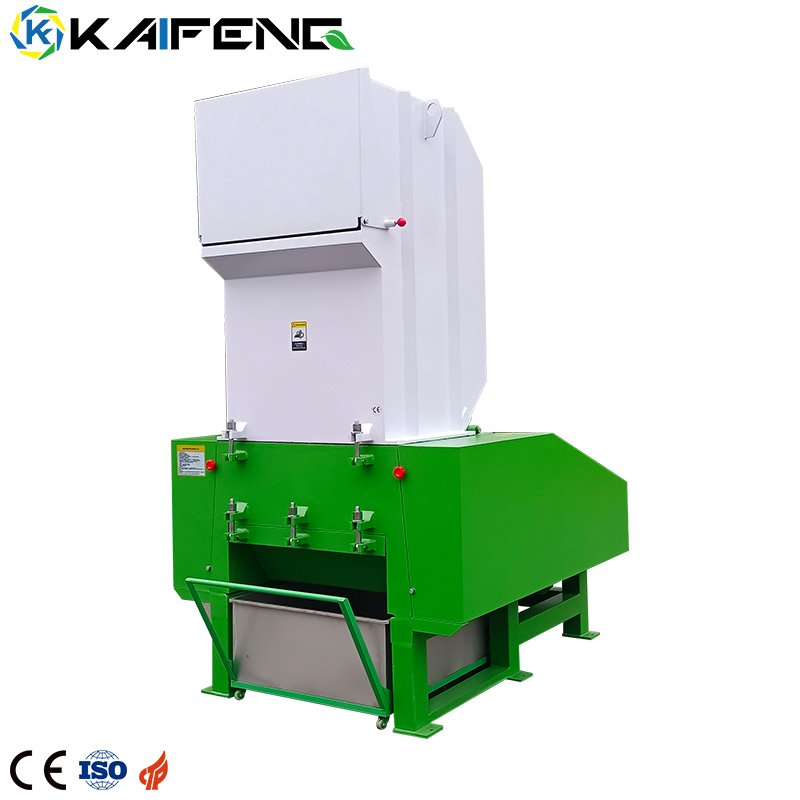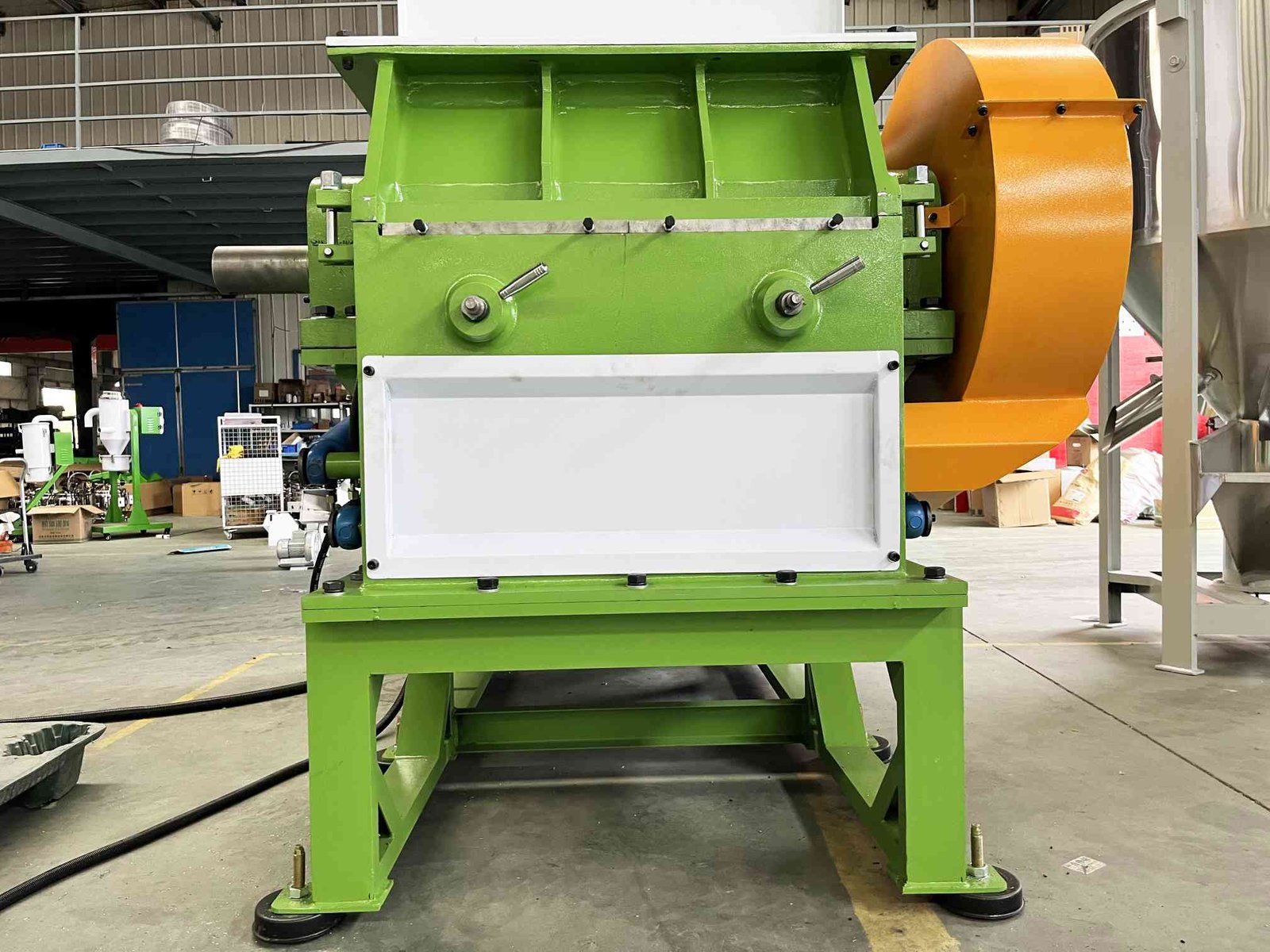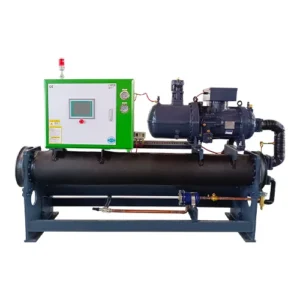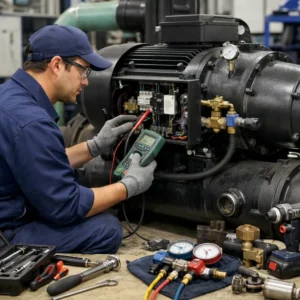産業現場におけるボトルクラッシャーの概要
現代の産業社会において、持続可能性は単なる流行語以上のものとなっている。あらゆる規模の企業は、廃棄物を責任を持って管理すると同時に、業務効率を向上させるよう、ますます強い圧力を受けている。このプロセスにおいて重要な役割を果たす機器の一つが、 ボトルクラッシャー. 大量のガラス瓶やプラスチックボトルを扱う企業にとって、廃棄物管理は時間とコストがかかる作業です。ボトルクラッシャーやプラスチッククラッシャーは、廃棄物の体積を削減するだけでなく、リサイクル作業を効率化する実用的な解決策を提供します。.
B2Bバイヤー、特にホスピタリティ、飲料製造、物流分野で事業を展開する企業にとって、効率的な廃棄物管理設備への投資はもはや任意の選択肢ではなく、競争優位性を構築する一環となっています。ボトルクラッシャーは単にボトルのサイズを縮小するだけのものではありません。リサイクル可能な廃棄物をより清潔に、安全に、そしてコスト効率良く処理する方向への転換を象徴する設備なのです。.
一般廃棄物圧縮機とは異なり、 プラスチック粉砕機 ボトルクラッシャーは、ボトルやプラスチック容器を処理するために特別に設計されており、材料の収集、輸送、リサイクルをより容易にします。持続可能性と業務効率を重視する企業は、廃棄物管理戦略の基盤としてボトルクラッシャーを位置付けることがよくあります。.

ボトルクラッシャーの作動原理
ボトルクラッシャーは、単純でありながら非常に効果的な原理で動作します:ボトルを小さく扱いやすい破片に砕くことです。モデルによって独自の設計があるかもしれませんが、中核となるプロセスは業界を問わず一貫しています。.
ホッパーへのボトルの投入: 最初のステップは、ボトルを機械のホッパーに投入することです。ここが、ガラス製またはプラスチック製のボトルがシステムに供給される投入口となります。.
破砕機構: 機械内部では、鋭い回転刃やローラーがボトルを粉砕する。 プラスチック粉砕機, 刃は頑丈なポリマー材料を切断するのに最適化されており、一方、ガラス瓶クラッシャーは瓶を小さく均一な破片に砕くことに重点を置いています。.
収集システム: 瓶が粉砕されると、破片は容器やコンテナに集められます。この収集システムにより、粉砕された材料は容易に保管、輸送、またはさらなるリサイクル工程へ供給することが可能となります。.
分離と安全: 高度なシステムには、ガラス片やプラスチック片を封じ込める分離機能が含まれる場合があり、安全性を確保するとともに周囲の作業スペースの汚染を防止します。.
ボトルクラッシャーとプラスチッククラッシャーの主な違いは、処理対象となる素材の種類にあります。ガラスクラッシャーは脆く壊れやすい素材を処理するよう設計されており、鋭いが扱いやすい破片を生成します。一方、プラスチッククラッシャーは耐久性のあるプラスチックボトルを切断し、新たな製品にリサイクルできる状態にします。.
このプロセスは廃棄物保管に必要な物理的スペースを削減するだけでなく、企業にとってリサイクルのコスト効率化も実現します。B2Bバイヤーにとって、破砕プロセスの仕組みを理解することは、当該設備が自社の産業ニーズに合致するか評価する上で役立ちます。.
ボトル・プラスチック粉砕機のビジネス用途
ボトルクラッシャーの汎用性は、幅広い産業分野において貴重な資産となっています。大量のボトル廃棄物を発生させる企業は、専門機器なしでの管理が困難な場合が多くあります。ここで活躍するのが ボトルクラッシャーとプラスチッククラッシャー 不可欠になる。.
ホスピタリティ産業
飲食店やホテル、バーでは毎日無数のガラス瓶やプラスチックボトルを扱っています。ボトルクラッシャーは、これらの事業者が保管スペースの問題を軽減し、廃棄物輸送コストを最小限に抑え、より清潔な作業環境を維持するのに役立ちます。.
飲料製造施設
清涼飲料水およびボトル入り飲料水の製造メーカーは、大量の包装廃棄物に対処している。廃棄物管理システムにプラスチック粉砕機を導入することで、リサイクルプロセスを効率化し、物流上の課題を軽減している。.
リサイクルプラントと物流会社
大規模リサイクル工場はボトルクラッシャーの恩恵を受けている。廃棄物をより速い速度で処理でき、さらなるリサイクルに向けた材料の準備が可能となるためだ。多くの物流企業もまた、使用を好む。 ボトル破砕装置 かさばる廃棄物の量を減らすため、輸送の安全性が高まり、コスト効率も向上する。リサイクル品を輸送する物流会社にもメリットがあり、砕かれた瓶は占有スペースが少なく、取り扱いが安全である。.
包装・流通センター
包装会社にとって、廃棄物は返品品や破損品として発生することが多い。ボトルクラッシャーはこれらの材料の廃棄を簡素化し、生産ラインを妨げることなく迅速に処理することを保証する。.
これらのアプリケーションはそれぞれ、どのように ボトルクラッシャー 単なる廃棄物処理装置ではなく、業務効率化の戦略的ツールでもある。コスト削減と業務効率化が優先されるB2B環境において、これらの粉砕機は測定可能な価値を提供する。.

B2Bバイヤーにとっての主な利点
産業調達における意思決定者にとって、真の疑問はボトルクラッシャーの仕組みだけでなく、なぜ投資する価値があるのかという点にあります。以下に最も重要な利点をいくつか挙げます:
廃棄物管理の改善: ボトルクラッシャーは廃棄物のサイズを縮小し、保管や輸送を容易にします。企業にとっては、これにより雑然とした状態が減り、作業環境が清潔になり、リサイクル作業の流れがスムーズになります。.
省スペースの利点: 砕かれた瓶は、そのままの瓶に比べて大幅にスペースを節約します。これは特に保管容量が限られている施設にとって有益であり、企業が業務エリアを最大限に活用することを可能にします。.
輸送コストの削減: 小型化・圧縮された廃棄物は、処分やリサイクルに必要な輸送回数を削減します。物流・廃棄物処理企業にとって、これは長期的に大きなコスト削減につながります。.
職場の安全と効率性: 瓶全体、特にガラス瓶は安全上のリスクを伴います。瓶クラッシャーはそれらを小さく安全な破片に変えることで危険を除去します。従業員は廃棄物処理に費やす時間を減らし、中核業務に集中する時間を増やせます。.
持続可能性と企業の社会的責任: 現代の多くの企業は環境への影響で評価される。プラスチック粉砕機の使用はリサイクルへの取り組みを示すとともに、持続可能性目標の達成を支援する。これは企業の評判を高めるだけでなく、環境配慮型実践への高まる需要にも合致する。.
B2Bバイヤーにとって、これらのメリットは単なる業務上の利点にとどまらず、コスト効率、職場の安全性、長期的な持続可能性といったより広範な戦略的目標を反映しています。.
ビジネスに最適なボトルクラッシャーの選び方
ボトルクラッシャーの仕組みを理解することは重要ですが、B2Bバイヤーは自社業務に適した機器の選定方法についても考慮する必要があります。.
材料に関する考慮事項: 企業は、ガラス瓶、プラスチックボトル、あるいはその両方の処理が必要かどうかを評価すべきである。瓶クラッシャーとプラスチッククラッシャーの選択は、最も頻繁に発生する廃棄物の種類によって決まる。.
廃棄物の量: 企業は、1日あたりに処理するボトルの平均数量を評価すべきである。技術的な仕様は不要だが、廃棄物処理能力を業務上のニーズに合わせることは買い手にとって極めて重要である。.
保守と信頼性: 粉砕機は長期的な投資です。購入者は、メンテナンスの容易さと動作の信頼性を兼ね備えた設備を検討すべきです。これにより、予期せぬ中断なく廃棄物管理を継続的に行うことが保証されます。.
サプライヤーの専門知識とアフターサービスサポート: 信頼できるサプライヤーとの連携は、適切な機械を選ぶことと同じくらい重要です。信頼できる ボトルクラッシャーメーカー 高品質な機械を提供するだけでなく、B2Bバイヤーに合わせた継続的なサポートも提供できます。知識豊富なサプライヤーは、優れた設備を納品するだけでなく、継続的なサポートを提供し、企業が投資効果を最大化できるよう支援します。.
廃棄物管理戦略との統合: ボトルクラッシャーは単独のツールとして捉えるべきではありません。むしろ、企業のより広範なリサイクルおよび廃棄物管理戦略に統合されるべきです。この統合により、最大限の効率性と長期的な持続可能性のメリットが確保されます。.
最終的に、ボトルクラッシャーとプラスチッククラッシャーの選択は、事業者の固有の要件によって決まります。B2Bバイヤーは、この設備を単発の購入ではなく、廃棄物管理における長期的なパートナーシップの一部と捉えることで、最大の利益を得られます。.

結論
A ボトルクラッシャー 単なる機械以上の存在です。これは企業が廃棄物を効果的に管理し、コストを削減し、持続可能性の目標を達成することを可能にする戦略的ソリューションです。これらのクラッシャーの仕組みを理解し、産業用途におけるその価値を認識することで、B2Bバイヤーは業務上のニーズと企業の社会的責任の両方に沿った、情報に基づいた意思決定を行うことができます。.
ホテルが保管スペースの最適化を図る場合、飲料メーカーがリサイクル工程の効率化を目指す場合、あるいは物流会社が輸送コスト削減を追求する場合においても、ボトルクラッシャーやプラスチッククラッシャーへの投資は、業務効率の向上に向けた賢明な一歩となる。.
持続可能な成長に取り組む企業にとって、適切な廃棄物管理設備の選択は、もはや廃棄物の処理だけにとどまらない。それはより効率的で責任ある未来を形作ることに他ならない。.




